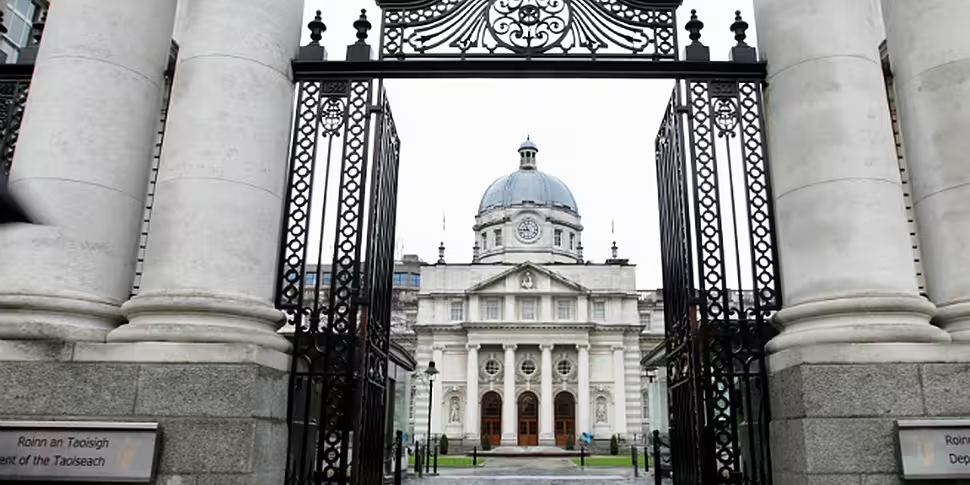Two members of the Cabinet say they are hopeful that a deal on extending the payback on our bailout loans could ease the austerity in upcoming budgets.
The Troika has recommended that Ireland and Portugal be given an extra seven years to repay money lent by the EU.
"Of course it will have benefits", declared Jobs Minister Richard Bruton.
"It gives stability and confidence and that's obviously of real, practical value to workers, business and to the community at large" he added.
The proposals will now be discussed by European Finance Ministers who'll attend an informal ECONFIN summit in Dublin this weekend.
"It has the possibility - if it comes through and we can't anticipate that - of reducing in effect the cost of our mortgage", said Education Minister Ruairi Quinn.
"It's not the arrival at the destination, but it's great encouragement to keep going" he added.
Fianna Fáil is denying that a deal on the repayment terms of our Troika loans would effectively be a second bailout.
"It isn't a second bailout, but you could see it in a way as an extension of the existing one and in a way that would be favourable for the country", according to Finance spokesman Michael McGrath.
He has also urged the coalition to pass on any benefits from any deal to the taxpayer by making the upcoming budgets less austere.
Meanwhile the independent budgetary advisors to government have warned against any easing up of planned spending cuts and tax hikes over the next 2 years.
"The Council’s assessment is that the planned adjustments of €3.1 billion in 2014 and €2 billion in 2015 should not be reduced" according to the Chair of the Irish Fiscal Advisory Council, Professor John McHale.
The coalition intends that savings from the promissory note deal could be used to ease up on the harshness of the next two budgets.
The council says sticking to the plan would result in a budget deficit of closer to 2% in 2015 - safely meeting the Troika target of 2.9% and be a buffer against any economic shocks.
The Council have been hawkish since they were set up and had been demanding billions of extra austerity over what the coalition and Troika had planned out - but is says the case for this is no longer being made because of the improved position.
Up to no now the coalition hasn't taken on board much of the assessment of the council, so their suggestion not to ease up on the austerity may well be ignored in the budget ahead of the local elections.
Some of the main points from the Irish Fiscal Advisory Council's assessment report include:
- Post-Budget 2013 developments have improved the budgetary outlook. Based on the better than expected Exchequer outturn and higher than forecast level of nominal GDP in 2012, it now appears likely that the 2012 General Government deficit will be significantly below 8 percent of GDP, which compares with a Budget-day estimate of 8.2 percent of GDP. This should have some beneficial carryover effects for future years. In addition, the promissory note transaction has reduced the projected 2015 deficit by 0.6 percent of GDP.
- Based on technical adjustments made by the Council to Budget 2013 projections to reflect the recent developments, the General Government deficit to GDP ratio in 2015 now appears likely to be closer to 2 percent of GDP (compared to the official forecast of 2.9 percent). This also assumes the full implementation of the Government’s planned €5.1 billion in consolidation measures in 2014-2015. The impact of the developments is estimated to be equivalent to €1.6 billion of additional adjustments over the period 2014-2015.
- The suggested margin of safety has therefore been broadly achieved under the Government’s current plans and so a case for the €1.9 billion in additional adjustments is not being made in this assessment. Overall, the fiscal stance remains conducive to prudent economic and budgetary management. However, the Council’s assessment is that the planned adjustments of €3.1 billion in 2014 and €2.0 billion in 2015 should not be reduced.
- There are significant uncertainties surrounding these budgetary projections. While there are tentative signs of a stabilisation in domestic demand, the weakening of growth in major trading partners is curbing growth in net exports.
- Expenditure pressures in Health and Social Protection in 2012, in part driven by service demand, have also raised concerns about the implementation of planned adjustment measures. However, improved monitoring in Health and a successful implementation of the Croke Park Extension Agreement should help underpin expenditure savings.









